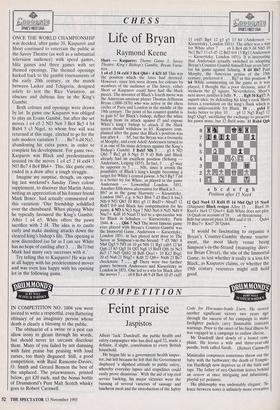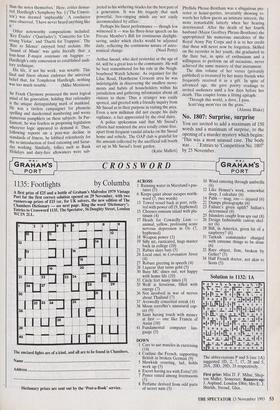COMPETITION
Feint praise
Jaspistos
IN COMPETITION NO. 1804 you were invited to write a respectful, even flattering obituary of an imaginary person whose death is clearly a blessing to the public.
The obituarist of a swine or a pest can allow irony to gleam through his words, but should never let sarcasm discolour them. Many of you failed by not damning with faint praise but praising with loud curses, too thinly disguised. Still, a good competition, with Basil Ransome-Davies, 0. Smith and Gerard Benson the best of the unplaced. The prizewinners, printed below, get £20 each, and the bonus bottle of Drummond's Pure Malt Scotch whisky goes to Robert Carnwell.
Albert 'Jack' Dandruff, the public health and safety campaigner who has died aged 52, made a definite, if slight, contribution to every British household.
He began life as a government health inspec- tor, but left because he felt that the Government displayed 'a slipshod attitude to public safety, whereby everyday lapses and stupidities could easily prove disastrous'. With the aid of top civil service backing, his major victories were the banning of several varieties of sausage and luncheon meat and the introduction of the Safety Code for Hot-water-bottle Users. He scored another significant victory two years ago through the success of his campaign to make firelighter packets carry flammable contents warnings. Prior to the onset of his final illness he was engaged in a campaign to outlaw cheese.
Mr Dandruff died slowly of a bowel com- plaint. He leaves a wife and three-year-old poodle, both called Sarah. (Robert Carnwell) Minimalist composers sometimes throw out the baby with the bathwater; the death of Temple- ton Hardleigh now deprives us of the bath and taps. The father of neo-Quietism leaves behind an oeuvre at once intriguing and infuriating, playful yet pedantic.
His philosophy was undeniably elegant; 'Si- lence between notes is infinitely more evocative than the notes themselves.' Here, critics demur- red. Hardleigh's Symphony No. 1 ('The Unwrit- ten') was deemed 'unplayable'. A conductor once observed, 'I have never heard anything like
Other noteworthy compositions included: Key Etudes' ('Quietudes'); 'Concerto for Un- strung Violas', and `Duetti for Trappists'. The Rite to Silence' enjoyed brief acclaim. His 'Sound of Music' was quite literally that: a four-hour F-major sostenuto on bagpipe — Hardleigh's only concession to established audi- tory technique.
His life, if not his work, was notable. This final and finest silence endorses the universal belief that, for Templeton Hardleigh, nothing was too much trouble. (Mike Morrison) Sir Frank Claymore possessed the most logical mind of his generation, holding that rationality is the unique distinguishing mark of mankind. He was a tireless campaigner for phonetic Spelling and duodecimal numbering and wrote numerous pamphlets on these subjects. In Par- liament, he was fearless in proposing legislation wherever logic appeared to demand it. Thus, following reports on a post-war decline in standards of fitness, he lobbied relentlessly for the re-introduction of food rationing and Satur- day working. Similarly, follies such as Bank Holidays and duty-free allowances were sub- jected to his withering tirades for the best part of a generation. It was his tragedy that such powerful, free-ranging minds are not easily accommodated by office.
Perhaps his finest performance — though few witnessed it — was his three-hour speech on his Private Member's Bill for continuous daylight- saving, under which clocks would be adjusted daily, reflecting the continuous nature of astro- nomical change. (Noel Petty) Arthur Snoad, who died yesterday at the age of 64, will be a great loss to the community. He will be best remembered for his role in the Neigh- bourhood Watch Scheme. As organiser for the Lilac Road, Hawthorne Crescent area he was indefatigable in discovering the smallest move- ments and habits of householders within his jurisdiction and gathering information about all visitors to them. Thus a stranger was easily spotted, and greeted with a friendly inquiry from Mr Snout as to their purpose in visiting the area. Even a new milkman did not escape his daily vigilance, a fact appreciated by the rival dairy.
A police spokesman said that Mr Snoad's efforts had rendered the area totally crime-free, apart from frequent vandal attacks on the Snoad home and vehicle. The OAP club is grateful for the amount collected by the unofficial toll booth set up in Mr Snoad's front garden.
(Katie Mallen) Phyllida Phrase-Bentham was a ubiquitous pre- sence at house-parties, invariably showing to- wards her fellow guests an intimate interest, the more remarkable latterly when her hearing deteriorated. After the death of her fourth husband (Major Geoffrey Phrase-Bentham) she appropriated his numerous anecdotes of the Royal Army Pay Corps and it is to her credit that these will never now be forgotten. Skilled on the recorder in her youth, she graduated to the flute but, in spite of enthusiasm and a willingness to perform on all occasions, never achieved the same mastery of that instrument.
The slim volume of her verses (privately published) is treasured by her many friends who frequently received it as a gift. In spite of advanced age, she gave poetry readings to invited audiences until a few days before her death. This couplet forms a fitting epitaph:
'Through this world, a dove, I pass,
Scatt'ring mem'ries on the grass.'
(Alanna Blake)



























































 Previous page
Previous page